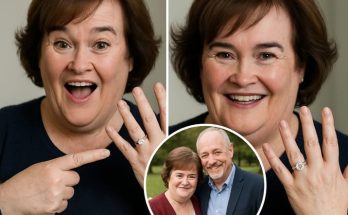
Angie Dickinson is more than just a name in Hollywood’s golden history—she is a trailblazer, a force of charisma, talent, and resilience who shattered barriers in both film and television. Over the course of a career spanning more than six decades, she became a symbol of female empowerment, playing roles that challenged conventions and paved the way for future generations of actresses.
With her striking beauty and undeniable screen presence, Dickinson was often cast in roles that played up her glamour. But beneath the surface, she was a fearless performer who refused to be typecast, proving time and again that she was just as commanding as her male counterparts.
From her meteoric rise in the 1950s to her groundbreaking role as Sergeant Pepper Anderson in Police Woman, Dickinson not only defined an era but left an indelible mark on Hollywood. Her personal life, filled with triumph and tragedy, only adds to her extraordinary legacy.
From Small-Town Girl to Hollywood Sensation
Born Angeline Brown on September 30, 1931, in Kulm, North Dakota, Dickinson’s journey to stardom was anything but ordinary. Growing up in a small town, her early ambitions had nothing to do with acting—she dreamed of becoming a writer.
It wasn’t until her family moved to California that her destiny shifted. While studying business at Glendale College, Dickinson entered a local beauty pageant on a whim, winning second place. That single moment set off a chain of events that would lead her to Hollywood.
Soon, she found herself in the world of entertainment, where her stunning looks and effortless charm caught the attention of casting agents. In the 1950s, she started landing minor roles in television, working tirelessly to make a name for herself.
Her big break came in 1959 when she starred opposite John Wayne and Dean Martin in the classic Western Rio Bravo. The role established her as a leading lady, capable of holding her own alongside some of the biggest stars of the time. With her smoky voice, confident demeanor, and undeniable sex appeal, Dickinson quickly became one of Hollywood’s most sought-after actresses.
Breaking Barriers in Hollywood
The 1960s and 1970s saw Dickinson reach the height of her career, starring in a mix of film and television roles that showcased her versatility. She worked with legendary directors like Howard Hawks and Don Siegel, appearing in films like Ocean’s 11 (1960) alongside the Rat Pack, The Killers (1964), and Point Blank (1967).
But while Hollywood adored her as a glamorous leading lady, Dickinson wanted more. She wanted substance over beauty, a chance to prove she could play complex characters beyond the usual femme fatale.
Her opportunity came in 1974, when she took on the role that would define her career—Sergeant Pepper Anderson in Police Woman.
It was a historic moment for television. At a time when women were still largely cast as sidekicks, love interests, or damsels in distress, Dickinson’s portrayal of a strong, independent female cop was revolutionary. She wasn’t just playing a tough character—she was redefining what women could be on screen.
Police Woman became a massive success, running for four seasons and earning Dickinson a Golden Globe Award. The show inspired thousands of women to pursue careers in law enforcement, proving that representation matters.
Though Dickinson never considered herself a feminist, her work spoke for itself. She became a role model for women who wanted to break into male-dominated fields, both in Hollywood and beyond.
The Price of Fame: Love, Loss, and Resilience
Despite her incredible success, Dickinson’s personal life was filled with both passionate romance and heartbreaking tragedy.
She was married twice, first to former football player Gene Dickinson, whose last name she kept, and later to composer Burt Bacharach. Her relationship with Bacharach was tumultuous, filled with ups and downs that played out in the public eye.
Their biggest heartbreak came with the birth of their daughter, Nikki, in 1966. Born prematurely, Nikki struggled with health issues her entire life, eventually being diagnosed with Asperger’s syndrome.
Despite her mother’s love and devotion, Nikki’s struggles took a devastating toll. In 2007, she tragically took her own life at the age of 40, a loss that forever changed Dickinson.
The pain of losing her daughter left her reevaluating her life and career. Though she continued to act, her focus shifted away from Hollywood’s bright lights.
A Lasting Legacy
Now in her 90s, Angie Dickinson lives a quiet life in Beverly Hills, making only occasional appearances in documentaries and interviews. Though she is no longer at the center of Hollywood’s spotlight, her impact is undeniable.
She paved the way for strong female leads, proving that women could be both glamorous and powerful, tough and feminine, sexy and intelligent.
Her work in Police Woman inspired countless female-driven crime shows, laying the groundwork for characters like Olivia Benson in Law & Order: SVU and Katherine Janeway in Star Trek: Voyager.
But beyond the roles, awards, and accolades, her greatest legacy is her resilience.
She was never afraid to take risks, to challenge the industry’s expectations, or to demand respect in an era when women were often overlooked.
Angie Dickinson: More Than a Hollywood Star
In a time when Hollywood is finally recognizing the contributions of women who paved the way, Angie Dickinson’s name deserves to be celebrated.
She was more than just a beautiful actress—she was a pioneer, a trailblazer, and a survivor.
Her story is one of talent, perseverance, and strength—a reminder that the most extraordinary women are often the ones who refuse to play by the rules.
Even today, decades after her prime, her influence remains.
And for that, Hollywood—and the world—owes her a debt of gratitude.



